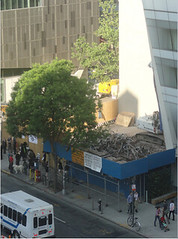About three dozen locals dressed in black held what they called a vigil at the ruins of 35 Cooper Square on Wednesday, lamenting the loss of the 19th century building that was built by a descendant of Peter Stuyvesant and once hosted the likes of Diane di Prima, William Burroughs and Cecil Taylor.
“This is truly a day of sadness, said Victor Papa, the president of the Two Bridges Neighborhood Council. “It was as precious as the White House, and it’s gone forever.”
Mr. Papa and at least a dozen others spoke in front of the plot of land that only two weeks ago featured the two and-a-half story home noted for its Federal-style architecture.
Now it was nothing more than a pile of rubble.
The fight to preserve 35 Cooper Square began late last year when preservationists, history buffs, and those simply weary of the rapidly changing neighborhood pressed the city Landmarks Preservation Commission to consider protecting the building from developers.
After a lengthy and often contentious campaign, scaffolding went up around the building in February and workers began demolishing the building about two weeks ago.
The owners of the property, Cooper and 6th Property LLC, have not revealed their plans for the space. But preservationists said this evening that the glass towers that flanked both sides of what remained of 35 Cooper — the new Cooper Union building to the north, the Cooper Square Hotel to the south — might foreshadow the site’s future.
“I don’t know what will be built here, but I imagine it will look like what’s on either side,” City Councilwoman Rosie Mendez told the crowd. “Lots of metal, and lots of glass.”
Indeed, the commission said that the building’s facade had been altered too much from its original state to merit protection.
“It’s left a bad taste in everyone’s mouth,” said David Mulkins, the chair of the Bowery Alliance of Neighbors. “They couldn’t dignify the tremendous outpouring from community groups with a public hearing.”
And Mr. Mulkins said that that outpouring was heartfelt.
“I live around the corner,” Mr. Mulkins said. “It’s personal. It’s like losing a member of the family.”






